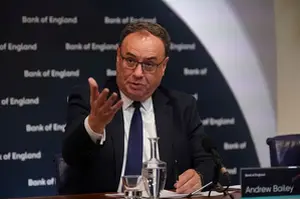
The fintech reckoning is upon us. Here’s what to expect next year
Bill Harris, the former PayPal CEO and veteran entrepreneur, strode onto a Las Vegas stage in late October to declare that his latest startup would help solve Americans' broken relationship with their finances.
"People struggle with money," Harris told CNBC at the time. "We're trying to bring money into the digital age, to redesign the experience so people can have better control over their money."
But less than a month after the launch of Nirvana Money, which combined a digital bank account with a credit card, Harris abruptly shuttered the Miami-based company and laid off dozens of workers. Surging interest rates and a "recessionary environment" were to blame, he said.
The reversal is a sign of more carnage to come for the fintech world.
Many fintech companies — particularly those dealing directly with retail borrowers — will be forced to shut down or sell themselves next year as startups run out of funding, according to investors, founders and investment bankers. Others will accept funding at steep valuation haircuts or onerous terms, which extends the runway but comes with its own risks, they said.
Top-tier startups that have three to four years of funding can ride out the storm, according to Point72 Ventures partner Pete Casella. Other private companies with a reasonable path to profitability will typically get funding from existing investors. The rest will begin to run out of money in 2023, he said.
"What ultimately happens is you get into a death spiral," Casella said. "You can't get funded and all your best employees start jumping ship because their equity is underwater."
'Crazy stuff'
Thousands of startups were created after the 2008 financial crisis as investors plowed billions of dollars into private companies, encouraging founders to attempt to disrupt an entrenched and unpopular industry. In a low interest rate environment, investors sought yield beyond public companies, and traditional venture capitalists began competing with new arrivals from hedge funds, sovereign wealth and family offices.
The movement shifted into overdrive during the pandemic as years of digital adoption happened in months and central banks flooded the world with money, making companies like Robinhood, Chime and Stripe familiar names with huge valuations. The frenzy peaked in 2021, when fintech companies raised more than $130 billion and minted more than 100 new unicorns, or companies with at least $1 billion in valuation.
"20% of all VC dollars went into fintech in 2021," said Stuart Sopp, founder and CEO of digital bank Current. "You just can't put that much capital behind something in such a short time without crazy stuff happening."
The flood of money led to copycat companies getting funded anytime a successful niche was identified, from app-based checking accounts known as neobanks to buy now, pay later entrants. Companies relied on shaky metrics like user growth to raise money at eye-watering valuations, and investors who hesitated on a startup's round risked missing out as companies doubled and tripled in value within months.
The thinking: Reel users in with a marketing blitz and then figure out how to make money from them later.
"We overfunded fintech, no question," said one founder-turned-VC who declined to be identified speaking candidly. "We don't need 150 different neobanks, we don't need 10 different banking-as-a-service providers. And I've invested in both" categories, he said.
One assumption
The first cracks began to appear in September 2021, when the shares of PayPal, Block and other public fintechs began a long decline. At their peak, the two companies were worth more than the vast majority of financial incumbents. PayPal's market capitalization was second only to that of JPMorgan Chase. The specter of higher interest rates and the end of a decade-plus long era of cheap money was enough to deflate their stocks.
Many private companies created in recent years, especially those lending money to consumers and small businesses, had one central assumption: low interest rates forever, according to TSVC partner Spencer Greene. That assumption met the Federal Reserve's most aggressive rate-hiking cycle in decades this year.
"Most fintechs have been losing money for their entire existence, but with the promise of 'We're going to pull it off and become profitable,'" Greene said. "That's the standard startup model; it was true for Tesla and Amazon. But many of them will never be profitable because they were based on faulty assumptions."
Even companies that previously raised large amounts of money are struggling now if they are deemed unlikely to become profitable, said Greene.
"We saw a company that raised $20 million that couldn't even get a $300,000 bridge loan because their investors told them `We are no longer investing a dime.'" Greene said. "It was unbelievable."
Layoffs, down rounds
All along the private company life-cycle, from embryonic startups to pre-IPO companies, the market has reset lower by at least 30% to 50%, according to investors. That follows the decline in public company shares and a few notable private examples, like the 85% discount that Swedish fintech lender Klarna took in a July fundraising.
Now, as the investment community exhibits a newfound discipline and "tourist" investors are flushed out, the emphasis is on companies that can demonstrate a clear path toward profitability. That is in addition to the previous requirements of high growth in a large addressable market and software-like gross margins, according to veteran fintech investment banker Tommaso Zanobini of Moelis.
"The real test is, does the company have a trajectory where their cash flow needs are shrinking that gets you there in six or nine months?" Zanobini said. "It's not, trust me, we'll be there in a year."
As a result, startups are laying off workers and pulling back on marketing to extend their runway. Many founders are holding out hope that the funding environment improves next year, although that is looking increasingly unlikely.
Neobanks under fire
As the economy slows further into an expected recession, companies that lend to consumers and small businesses will suffer significantly higher losses for the first time. Even profitable legacy players like Goldman Sachs couldn't stomach the losses required to create a scaled digital player, pulling back on its fintech ambitions.
"If loss ratios are increasing in a rate increasing environment on the industry side, it's really dangerous because your economics on loans can get really out of whack," said Justin Overdorff of Lightspeed Venture Partners.
Now, investors and founders are playing a game of trying to determine who will survive the coming downturn. Direct-to-consumer fintechs are generally in the weakest position, several venture investors said.
"There's a high correlation between companies that had bad unit economics and consumer businesses that got very large and very famous," said Point72's Casella.
Many of the country's neobanks "are just not going to survive," said Pegah Ebrahimi, managing partner of FPV Ventures and former Morgan Stanley executive. "Everyone thought of them as new banks that would have tech multiples, but they are still banks at the end of the day."
Beyond neobanks, most companies that raised money in 2020 and 2021 at nosebleed valuations of 20 to 50 times revenue are in a predicament, according to Oded Zehavi, CEO of Mesh Payments. Even if a company like that doubles revenue from its last round, it will likely have to raise fresh funds at a deep discount, which can be "devastating" for a startup, he said.
"The boom led to some really surreal investments with valuations that cannot be justified, maybe ever," Zehavi said. "All of these companies across the world are going to struggle, and they will need to be acquired or shut down in 2023."
M&A flood?
As in previous down cycles, however, there is opportunity. Stronger players will snap up weaker ones through acquisition and emerge from the downturn in a stronger position, where they will enjoy less competition and lower costs for talent and expenses, including marketing.
"The competitive landscape shifts the most during periods of fear, uncertainty and doubt," said Kelly Rodriques, CEO of Forge, a trading venue for private company stock. "This is when the bold and the well capitalized will gain."
While sellers of private shares have generally been willing to accept bigger valuation discounts as the year went on, the bid-ask spread is still too wide, with many buyers holding out for lower prices, Rodriques said. The logjam could break next year as sellers become more realistic about pricing, he said.
Eventually, incumbents and well-financed startups will benefit, either by purchasing fintechs outright to accelerate their own development, or picking off their talent as startup workers return to banks and asset managers.
Though he didn't let on during an October interview that Nirvana Money would soon be among those to shutter, Harris agreed that the cycle was turning on fintech companies.
But Harris — founder of nine fintech companies and PayPal's first CEO — insisted that the best startups would survive and ultimately thrive. The opportunities to disrupt traditional players are too large to ignore, he said.
"Through good times and bad, great products win," Harris said. "The best of the existing solutions will come out stronger and new products that are fundamentally better will win as well."






